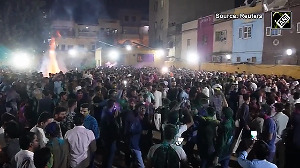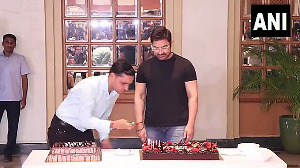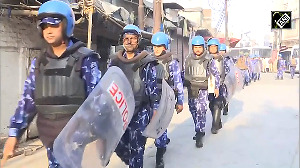 The Supreme Court on Wednesday dismissed the curative petition of the Centre filed against the commutation of death penalty into life imprisonment of three convicts in the Rajiv Gandhi assassination case, granting a fresh lease of life to them.
The Supreme Court on Wednesday dismissed the curative petition of the Centre filed against the commutation of death penalty into life imprisonment of three convicts in the Rajiv Gandhi assassination case, granting a fresh lease of life to them.
"We have gone through the Curative Petitions and the relevant documents. In our opinion, no case is made out within the parameters indicated in the decision of this Court in Rupa Ashok Hurra vs. Ashok Hurra & Another, reported in 2002 (4) SCC 388.
"Hence, the Curative Petitions are dismissed," a five- judge bench headed by Chief Justice H L Dattu said.
The brief decision of the bench, also comprising justices T S Thakur, A R Dave, Ranjan Gogoi and Shiva Kirti Singh, came on the curative pleas filed by the then UPA government against dismissal of the review petitions.
The review pleas, challenging the commutation of death penalty to life term of Santhan, Murugan and Perarivalan, were dismissed by the court in February last year on the ground of 11-year delay in deciding on their mercy petitions.
The three convicts are lodged in a Vellore prison. Rajiv Gandhi was assassinated on May 21, 1991 at Sriperumbudur in Tamil Nadu.
Meanwhile, a five-judge Constitution bench is hearing another petition of the Centre challenging the Tamil Nadu government's decision to set free seven convicts in the high profile case.
The convicts, sought to be released by the state government, are V Sriharan alias Murugan, Santhan, Robert Pious, Jaya Kumar, Nalini, Ravichandran and Arivu.
Recently, the court had allowed state governments to exercise its powers of remission to release life convicts with a rider that this would not apply to cases probed by central agencies like CBI and for those incarcerated under central laws such as TADA.
Lifting its stay imposed over a year back, the apex court said the relaxation would also not apply where the convict has been awarded life term in sexual offence cases of rape and murder.
Prior to this, on the plea of the erstwhile UPA government, it had stayed Tamil Nadu's decision to set free all the seven convicts after remitting their sentences. It had framed seven questions to be decided by a constitution bench on the scope of executives' power of remission.









 © 2025
© 2025